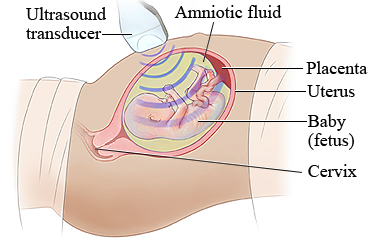
What is a fetal ultrasound?
Fetal ultrasound is a test that lets your doctor see an image of your baby. Your doctor learns information about your baby from this picture. You may find out, for example, if you are having a boy or a girl. But the main reason you have this test is to get information about your baby's health.
(You may hear your baby called a fetus. This is a common medical term for a baby that's growing in the mother's uterus.)
What kind of information can you learn from this test?
The findings of an ultrasound fall into two categories, normal and abnormal.
Normal
- The fetus is the right size for its age.
- The placenta is the expected size and does not cover the cervix.
- There is enough amniotic fluid in the uterus.
- No birth defects can be seen.
Abnormal
- The fetus is small or large for its age.
- The placenta covers the cervix.
- There is too much or too little amniotic fluid in the uterus.
- The fetus may have a birth defect.
What does an abnormal result mean?
Abnormal seems to imply that something is wrong with your baby. But what it means is that the test has shown something the doctor wants to take a closer look at.
And that's what happens next. Your doctor will talk to you about what further test or tests you may need.
What do the results mean?
Some of the things your doctor may see on an abnormal ultrasound include:
- Echogenic bowel.
-
The bowel looks very bright on the screen. This could mean that there's blood in the bowel. Or it could mean that something is blocking the small bowel.
- Increased nuchal translucency.
-
The ultrasound measures the thickness at the back of the baby's neck. An increase in thickness is sometimes an early sign of Down syndrome.
- Increased or decreased amniotic fluid.
-
The doctor will look for a reason for the level of amniotic fluid and will watch the pregnancy closely as it progresses.
- Large ventricles.
-
Ventricles in the brain look larger than they should. Your doctor may take a closer look at the brain.
- Renal pyelectasis/hydronephrosis.
-
The ultrasound measures the fluid around the kidney. If there is more fluid than expected, there is a chance of urinary tract or kidney problems.
- Short long bones.
-
The ultrasound measures certain arm and leg bones. A long bone (humerus or femur) that is shorter than average could be a sign of Down syndrome.
- Subchorionic hemorrhage.
-
An ultrasound can show bleeding under one of the membranes that surrounds the fetus. Some women don't have symptoms of bleeding. The ultrasound can find this problem when women are not bleeding from their vagina. Women who have this condition have a slightly higher chance of miscarriage.
What do you do now?
Take a deep breath, and let it out. Keep in mind that an abnormal finding on an ultrasound, after it's coupled with more information, may:
- Turn out to be nothing.
- Turn out to be something mild that won't affect the baby.
- Turn out to be something more serious. But if this happens, early diagnosis helps you and your doctor plan treatment options sooner rather than later.
Your medical team is there for you. So are your family and friends. Ask questions, and get the help and support you need.
Follow-up care is a key part of your treatment and safety. Be sure to make and go to all appointments, and call your doctor if you are having problems. It's also a good idea to know your test results and keep a list of the medicines you take.
Where can you learn more?
Go to http://www.healthwise.net/patientEd
Enter K451 in the search box to learn more about "Learning About Fetal Ultrasound Results".
Current as of: April 30, 2024
Author: Ignite Healthwise, LLC Staff
Clinical Review Board
All Ignite Healthwise, LLC education is reviewed by a team that includes physicians, nurses, advanced practitioners, registered dieticians, and other healthcare professionals.

